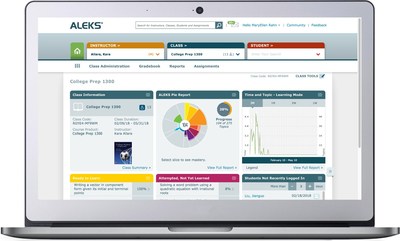Two New Research Studies Show Positive Results for McGraw-Hill's ALEKS Adaptive Learning Technology
Peer-Reviewed Studies Show Significant Learning Gains - Up To a 15-Point Pass Rate Improvement in One Study - For College Students Who Used ALEKS
Aug 15, 2018
NEW YORK, Aug. 15, 2018 /PRNewswire/ -- Two research studies published in the first half of 2018 show significant learning gains, including a 15-point pass rate improvement, for college students using McGraw-Hill Education's ALEKS adaptive learning technology in math and chemistry. The studies looked at the effects of ALEKS on nearly 12,000 students at two public institutions -- West Virginia University and Milwaukee Area Technical College.

Based on the theory of "knowledge spaces" from cognitive science, ALEKS creates a personalized and dynamic learning path for K-20 students based on their unique needs. Since all students enter a course with varying levels of preparedness, ALEKS's technology pinpoints what students already know, what they don't and, most importantly, what they're ready to learn next. Rooted in research and analytics, ALEKS helps improve student outcomes by fostering better preparation, increased motivation and knowledge retention.
"These two new studies are valuable pieces of evidence that add to a deep body of research showing that ALEKS works," said Al Essa, VP of Analytics and R&D at McGraw-Hill. "Our research and implementation experience shows that, when instructors leverage our educational technology as a tool to meet students where they are in their math and chemistry journeys, students consistently perform better than when using more traditional teaching models that are often less personalized to individual needs."
The two studies released in 2018 continue to build on research showing the powerful effects that ALEKS can have on student learning outcomes.
1) General Chemistry: The results of a four-year study involving more than 8,500 students at West Virginia University (WVU) and conducted by WVU researchers were published in the Journal of Chemical Education, the leading research journal in chemical education, published by the American Chemical Society. The study said the following:
"The adaptive system [ALEKS] was found to increase the odds of a higher final letter grade for average, below average, and failing students.....Specific to [ALEKS], most students (95%) reported engaging in remediation of incorrect responses, a majority of students (69%) reported changes in study habits, and students recognized the benefit of using [ALEKS] by ranking its assignments and explanations or review materials as two of the top three most useful course aspects contributing to perceived learning."
Citation:
General Chemistry Student Attitudes and Success with Use of Online Homework: Traditional-Responsive versus Adaptive-Responsive
Michelle Richards-Babb, Reagan Curtis, Betsy Ratcliff, Abhik Roy, and Taylor Mikalik
J. Chem. Educ. 2018 95 (5), 691-699
DOI: 10.1021/acs.jchemed.7b00829
2) Math: According to research published for the International Conference on Learning Analytics & Knowledge, students who used ALEKS at Milwaukee Area Technical College (MATC) passed their math courses more often than students who did not use ALEKS. The research, which leveraged data collected from 3,400 students in 198 sections of pre-algebra, elementary and intermediate algebra and college math, was conducted jointly by McGraw-Hill data scientists and Dr. Ryan Baker, a professor at the University of Pennsylvania who is a member of the advisory board of McGraw-Hill's Learning Science Research Council.
The research, which matched students by age, race and placement test scores, showed that ALEKS students at MATC "had statistically significant higher pass rates…achieving a boost of 15 points in pass rates." Students using ALEKS were 1.27 times more likely to pass the course compared to students not using ALEKS. The paper continued, "ALEKS is statistically significantly more effective at enhancing pass rates compared to the control condition."
Citation:
Studying Adaptive Learning Efficacy using Propensity Score Matching
Shirin Mojarad, Alfred Essa, and Ryan S. Baker
Companion Proceedings 8th International Conference on Learning Analytics & Knowledge (LAK18)
To learn more about ALEKS in higher education and read more success stories, visit: https://www.mheducation.com/highered/aleks.html
About McGraw-Hill Education
McGraw-Hill Education is a learning science company that delivers personalized learning experiences that help students, parents, educators and professionals drive results. McGraw-Hill Education has offices across North America, India, China, Europe, the Middle East and South America, and makes its learning solutions available in more than 60 languages. Visit us at mheducation.com or find us on Facebook, Instagram, LinkedIn or Twitter.
Contact:
Tyler Reed
McGraw-Hill Education
(646) 766-2951
tyler.reed@mheducation.com
SOURCE McGraw-Hill Education
